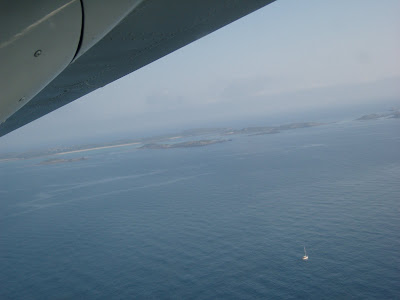This, "
The Box" (Sw "Lådan") is the first book by
Günter Grass I have ever read, even though I usually make some kind of effort with the Nobel Prize Laureates. I saw "The Tin Drum", the film, when I was in high school and I liked it well enough, even though at the time it was not really a film I would have gone to see. My taste in all things has improved, or so I´d like to think.
This is his latest, a novel for sure, but autobiographical. What he has done is to fictionalize his own children (6 biological, 2 aquired by marriage) and let them meet a number of times to discuss different aspects of their childhood. A somewhat fragmented imaged appears, of Günter Grass as Vatti, the father.
The children are actually not in any conflict about what kind of father he was: he was hardly ever there. He had his study in the attic, he didn´t play, he was often away on political crusades, he remarried. He had four children with his first wife, one with his second, one with a passing acquaintance, got two extra when he married his last. Instead, there is a lot of talk about father´s companion, "our Mariechen" (our little Marie), an elderly woman with a camera. Marie is not a real person, she is far too extraordinary for that. Rather, she is what is extraordinary about Günter Grass. She is his imagination. Her pictures show not what the camera has been aimed at, but what is the dream connected to that subject. Her photos of the bombed out houses in Berlin, for example, shows how they were furnished before the war. Her photos of little Nana (the girl who never got to live with her father) shows Nana, her father and mother dancing among the clouds together.
Mariechen takes photos for the children too, like when the boy Taddel misunderstands what he is told about his dad working with the election and thinks he´s gone whale hunting (the word for whale and election is the same in Swedish and, I suspect, German too), Mariechens photos shows Vatti in a boat with a spear in his hand. Or when Lara´s dog Joggi has disappeared, the photos show the dog taking the subway across town, having all kinds of adventures.
When there is chaos in the family, Mariechen comes more seldom. She does not like chaos, and takes no photos of it. This is when Grass divorces his first wife. When the artist can´t work, neither does Mariechen. She works for Grass, and when Mariechen is there, they are all at their happiest. When he moves to northern Germany with his last wife, Mariechen moves with them. But when they move away from there, on his wife´s initiative, Mariechen dies. Vatti is old and it is also the end of childhood. However, the children suspects that Vatti has the camera stashed away somewhere. There is some hope for the artist yet...
I think that what Grass is aiming at is that whatever he has given to his children, is what he has also given to the world, and that is his imagination. Either the result of it or - I think he hopes for his children - the ability to imagine for oneself. He also says something profound about how we remember our childhood - that the sweetest memories are made up. And that is all right. But there is also a deep sense of grief in this story. He lets one of the children mention at the end that the father wanted to gather his children like this when he got the Nobel Prize, but none of them were willing to talk. And now, ten years later, instead the father imagines his children, he imagines them "until they are present and casting shadows" (that´s not a direct quote, but a translation from the text). I can´t help but suspect that his children aren´t much available to speak either to him or to each other. As grown children tend not to be. But then don´t we all tend to think other families are happier than ours. Except Günter Grass, which is why I imagine he has published this book.
 |
| Mariechen sometimes takes pictures between her legs. |
Grass, who is an artist as well as a writer, has illustrated the book with pictures of Mariechen with her camera, one for every chapter. I think they are charming, an image of the writer´s soul, perhaps. Or at least a splinter of it, an aspect, a recurring dream, perhaps. Maybe she was a real person from his childhood, who became an archetype for his imagination? Who knows? We are his readers, not his analysts.
I think some of the critics I have read have been a bit ungenerous towards this book. Of course, I haven´t read any of his others and can´t compare, but I think this is a very special little book. It says something rather profound about fathers and children, in a way both playful and serious. I´m quite sure that I will never forget it.










































